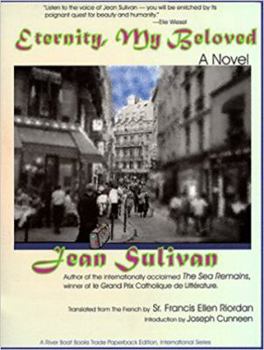Eternity, My Beloved
Eternity, My Beloved tells the story of a rebel priest, Jerome Strozzi, who falls between the cracks of both church and state during the German occupation of Paris during World War II. Befriending... This description may be from another edition of this product.
Format:Paperback
Language:English
ISBN:096547562X
ISBN13:9780965475624
Release Date:July 1999
Publisher:River Boat Books
Length:146 Pages
Weight:1.80 lbs.
Related Subjects
Contemporary Fiction Genre Fiction Historical Humanities Literature Literature & FictionCustomer Reviews
5 ratings
Jean Sulivan, Rebel Prophet of God's Kingdom
Published by Thriftbooks.com User , 24 years ago
The first giveaway of Eternity, My Beloved is the epigraph which informs the reader that the title is borrowed from Nietzche: "I have never found the woman by whom I would want to have a child except this woman that I love--for I love you, eternity, my beloved." Official Catholic teaching rarely quotes that particular German philosopher for a defense of celibacy! But the phrase very aptly captures the spirit of the novel's protagonist, Father Jerome Strozzi, aka Tonzi (based on an actual worker-priest named Auguste Rossi) who immerses himself in the demi- monde of Paris' prostitutes, pimps and petty criminals. Once again the narrator plays a major part, this time complaining that Strozzi has hijacked his plan to write a novel about a prostitute named Elizabeth. But Strozzi's combination of anti- bourgeois sentiment, gospel conviction and humility proves irresistible. Freedom, that elusive gift Juan Ramon spent most of his life seeking without realizing it and only finally grasped in an act of self-incarceration, is Tonzi's hallmark. It allows him to plunge into incriminating circumstances daily, to see God's providence in an act of betrayal, a missed train or an eviction, to touch the hearts of street-wise prostitutes simply because his agenda is entirely unhidden. "A long time ago he had recognized as a secret vice the habit of embracing formulas [e.g., `Arise, take up...'], building arguments, using the Son of Man as another object, situating Jesus in history instead of, even today, living one's life sufficiently within His so as to grasp the meaning of those phrases and trying over and over to understand them. He apologized for being tactless, because it seemed to him that no one had the right to use these words if his own life had not first transformed them into bread and wine, into flesh and blood, and if he couldn't say them in his own personal voice." [61]As the novel develops the narrator (named Sulivan) becomes more and more obsessed with Strozzi and his powerful influence over people, especially prostitutes. Like a true modern, he professes skepticism about Strozzi's celibacy but can find no evidence to impugn it; rather, the women speak of his friendship and his demand that they exercise their spiritual freedom. "All that he was good for was to rekindle light in eyes that had become dead. Meanwhile he was paying the price." He is regularly roughed up by the pimps whose business he threatens and reported to the chancery by virtuous Christians whose wayward pleasures he subverts. The first giveaway of Eternity, My Beloved is the epigraph which informs the reader that the title is borrowed from Nietzche: "I have never found the woman by whom I would want to have a child except this woman that I love--for I love you, eternity, my beloved." Official Catholic teaching rarely quotes that particular German philosopher for a defense of celibacy! But the phrase very aptly captures the spirit of the novel's protagonist, Father Jero
A Staretz in Paris
Published by Thriftbooks.com User , 24 years ago
Sulivan does a wondrous thing: he tells his tale in two keys. It is both a post-modern tale of urban tragedy and chaos, and a kind of hagiography replete with references to St. John of the Cross, St. Teresa of Avila, and especially St. Francis de Sales. He manages to strip the pietistic mask from Christian sanctity and reveal just how gritty, scandalous, and healing the Spirit of Christ is in every age.
What makes a holy fool tick?
Published by Thriftbooks.com User , 25 years ago
"The novel takes us on a journey through Sulivan's desire for understanding. Strozzi is irresistible -- what makes this holy fool tick? He exudes a peace that Sulivan both gravitates toward and finds annoying. We see Sulivan struggling with the finiteness of words in the face of infinity, and through the struggle, we see him create beauty out of his humanness." -- Kelley E. Evans, SOJOURNERS
A priest and a retired whore in occupied Paris.
Published by Thriftbooks.com User , 25 years ago
"Jerome Strozzi is a renegade priest who roams the seamiest side of Paris resurrecting the dead. No wonder he barges in and takes over Jean Sulivan's novel, "Eternity, My Beloved." which was supposed to be about a retired whore called Elizabeth ... The book stabs at the deepest stuff of life and it might, if only in those flashes when eternity cracks and you slip the border into that buried beyond, let you see again that it is all possible, all right here waiting to be lived. Because Strozzi is. Because Strozzi bears witness that eternity is now and resurrections can happen on any corner." -- Tim McCarthy, NATIONAL CATHOLIC REPORTER
Unusual priest gets in trouble in Nazi-occupied Paris
Published by Thriftbooks.com User , 25 years ago
"Eternity, My Beloved" recounts the tale of an unusual priest who gets into trouble with both the authorities of the church and those of Nazi-occupied Paris. The narrator discovers that it is not to the world of prostitution that Strozzi had most to say, but 'to all those who prefer money, order and comfort to love.' The broaching of the impossible is precisely what makes Sulivan an important writer of Christian inspiration." -- Padraig O Gormaile, The Irish Times





